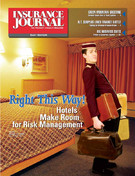While Massachusetts’ officials are overhauling their auto insurance residual market in hopes of attracting new insurers, it is becoming increasingly clear that the legislature will have to join the reform effort if those hopes are to be realized.
Regulatory efforts now underway to transform the residual market, known as Commonwealth Auto Reinsurers (CAR), into the Massachusetts Assigned Insurance Plan (MAIP), are not sufficient to entice insurers to come into the market, even if they are 100 percent successful, according to key companies that reformers would like to welcome some day.
Neither State Farm nor Progressive Insurance, two companies cited by Gov. Mitt Romney as ones he’d like to attract, will be entering Massachusetts anytime soon, officials of these companies told Insurance Journal.
While the MAIP plan is commendable, these “outsiders” say rate subsidies, rating freedom and other obstacles will remain – issues that must be changed legislatively.
James Haas, direct product manager for Progressive, agrees with the changes now being made but cautions that they fall short of the “significant changes” needed to attract his company.
“Simply put, Massachusetts does not operate as a free market. Progressive is committed to the free market system,” he said.
What will it take to lure Progressive?
“Massachusetts should allow insurers to set their own rates, based on their own experience. Insurers should be allowed to introduce new rating variables and should be able to set the relativities for these variables. Massachusetts should also no longer mandate large inter-class subsidies in the rates,” said Haas.
Haas contended that many of the unique features of the Massachusetts system are unnecessary. “It doesn’t have to be this way. Massachusetts’ regulatory system may be unique but its challenges are not. Many states have their population concentrated in a single, large metropolitan area. Many states face escalating health costs. And many states fight aggressive and sophisticated fraud rings. And yet no other state has adopted anything like the regulatory system found in Massachusetts,” Haas testified during hearings before Insurance Commissioner Julianne Bowler, who is expected to approve the MAIP.
Haas cited Illinois as an example of a different approach. Chicago is larger than Boston and yet Illinois has one of the most open regulatory systems for auto insurance in the country. The results: more than 80 auto insurers write there and the average annual premium ranks 29th highest in the country, compared to a ranking of fifth highest for Massachusetts, according to the company’s own analysis.
State Farm, which is not a large player in the state — it limits its writings to insureds relocating to the Bay State from other states — has a similar view. The proposed MAIP would be a “significant improvement over the existing mechanism,” David Tideman, State Farm counsel, told Bowler at recent public hearings.
But if they want State Farm to join the fray, officials must do more.
Tideman told Insurance Journal that his company, which accepted an invitation to discuss the issue with Gov. Romney in the spring, is not in a position to get too specific. “We have not studied the practical aspects,” he said.
But in his testimony, Tideman did outline characteristics of what State Farm sees as effective systems. These traits include a separate rate for assigned risks; clear identification to insureds of any rate subsidies; the ability of companies to develop their own underwriting standards and freedom for insurers to select their own voluntary customers.
Gov. Romney recognized that legislative action would be required when he named a task force last April to come up with recommendations. “The goal of the task force is to form a consensus for a fair and smooth transition to a competitive marketplace,” Romney said at the time.
Romney asked the task force to report by year’s end.
Meanwhile, the hearing process for 2005 is getting underway. The Automobile Insurers Bureau of Massachusetts (AIB) has requested an average increase of 5.8 percent —about $250 million. If approved in full, the 5.8 percent request would increase the average rate by $68, raising it to $1144. The recommendation is subject to counterproposals and a round of public hearings before the commissioner issues final 2005 rates in mid-December.
Was this article valuable?
Here are more articles you may enjoy.


 Zurich Insurance’s Beazley Bid Sets the Stage for More Insurance Deals
Zurich Insurance’s Beazley Bid Sets the Stage for More Insurance Deals  Chubb CEO Greenberg on Personal Insurance Affordability and Data Centers
Chubb CEO Greenberg on Personal Insurance Affordability and Data Centers  The $3 Trillion AI Data Center Build-Out Becomes All-Consuming for Debt Markets
The $3 Trillion AI Data Center Build-Out Becomes All-Consuming for Debt Markets  Winter Storm Fern to Cause Up to $6.7B in Insured Losses
Winter Storm Fern to Cause Up to $6.7B in Insured Losses 


